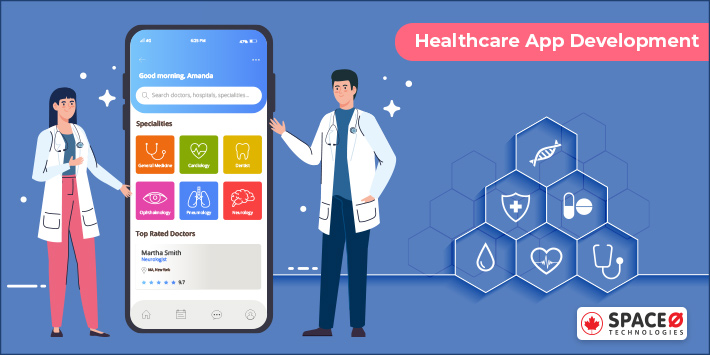
Contents
Developing a Mobile Healthcare App: How and Why
The market for health apps is rapidly growing, with thousands of healthcare applications available on the App Store and Google Play. Wondering if creating a healthcare mobile app is worth it? The short answer is yes.
Today, people use healthcare apps for various purposes such as scheduling appointments, reviewing prescriptions, accessing medical records, and connecting with doctors via video calls. According to Statista, the mobile health market is projected to exceed $300 billion by 2025.
Not sure where to start? Read on for helpful tips on how to create a mobile healthcare app, what technologies to use, and how to monetize your app.
The future of healthcare mobile app development
Advanced technologies have revolutionized the healthcare industry, with patients using personal healthcare apps more than ever for health advice, virtual consultations, e-prescriptions, etc.
As of 2017, there were over 325,000 mHealth apps, and the demand has increased significantly in recent years, especially due to COVID-19. Social distancing guidelines and closures have led to a growing demand for remote health and fitness services, diagnoses, and prescription services. Real-time chat and video capabilities have allowed patients to connect with doctors for discussions on diagnoses and treatments.
There is a clear and growing demand for medical IT solutions, making it the perfect time to create a new medical app.
Technology used in mobile healthcare apps
When developing a business around a technology boom, it’s crucial to understand what is relevant and growing in the space. Here are some trends in mobile healthcare app development for 2021.
Artificial intelligence
AI plays a vital role in most major healthcare app systems. It assists in diagnostics, treatment, data analysis from medical records, and drug development. Startups benefit from automation, and integrating AI into mobile app development minimizes errors and streamlines solutions for healthcare providers.
Blockchain technology
Blockchain is not only revolutionizing the fintech industry but also transforming healthcare. Integrating blockchain technology into healthcare mobile apps allows secure sharing and storage of sensitive data for doctors and patients. It ensures high-level security and data confidentiality within healthcare apps.
Virtual reality
Virtual Reality solutions are transforming patient lives and medical practices. VR-based mobile applications aid in the treatment of various diseases, and they also help future doctors practice and plan surgical procedures. The potential for VR in the healthcare sector is significant and will continue to enhance patient care and improve physicians’ work.
Internet of Things (IoT)
IoT has already made its way into the healthcare sector, transforming medical practices. Doctors can continuously monitor patients’ health and make recommendations through IoT. Users can connect special medical devices to smartphones for constant monitoring of health data such as blood pressure, blood sugar levels, and heart rate.
Telemedicine
Telemedicine offers many advantages over traditional healthcare visits and has become more important than ever due to the need for remote appointments, medical care, and clinical visits.
Creating a healthcare mobile app
To build a successful healthcare mobile application, follow these steps:
1. Market research
Understand your competition, the overall market, and determine if there’s a need for your solution. Conduct market research to answer questions such as the type of healthcare app you want to build, the problem it solves, the target audience, competitors, and how your app differs from others. Chat with potential customers, conduct focus groups and surveys, and shadow healthcare professionals to gather valuable insights.
2. Determine platforms and mHealth technologies to use
Decide whether to build an app for Android or iOS based on audience, app features, project timeline, and budget. Consider the geographic location of your target audience when choosing platforms. You can create native apps for both platforms to reach more users.
3. Create an MVP
Start with a minimum viable product (MVP) to get your app to market quickly and minimize costs. Find a trusted development company with experience in mHealth app development. Have a clear understanding of necessary functionality, UI/UX design, and privacy and compliance requirements. Thoroughly vet developers before selecting them.
4. Test your healthcare app before launch
Thoroughly test your app before launching it to ensure ease of use, simplicity, and high-level security and confidentiality of patient data. Proper testing is crucial, especially for mobile health apps with specific development and testing requirements.
Best revenue models for healthcare mobile apps
Now, let’s discuss how you can make money with your free mHealth app. Charging users for downloading the app may seem like the easiest way, but the highest-grossing apps are usually free to download. Explore other monetization models for healthcare apps:
Freemium
Offer a free version of your app with access to basic functionality, and a premium version with additional features that users can pay for.
Localized ads
Show relevant advertisements in your medical app. Use GPS, Wi-Fi, or beacons to display ads based on users’ locations.
Registration and subscription fees
Charge doctors a monthly fee to connect with patients on a platform or offer subscription plans for patients after a free trial period.
Access to advanced content
Offer valuable content to healthcare employees for free, but charge for access to additional content.
Hello!
I’m Andrew Brooks, a seasoned finance consultant from the USA and the mind behind phonenumber247.com.
My career is built on a foundation of helping individuals and businesses thrive financially in an ever-changing economic landscape. At phonenumber247.com, my aim is to demystify the complex world of finance, providing clear, actionable advice that can help you navigate your financial journey with confidence. Whether it’s personal finance management, investment strategies, or understanding the nuances of market dynamics, I’m here to share insights and tools that can propel you towards your financial goals.
Welcome to my digital space, where every piece of advice is a step closer to financial clarity and success!
